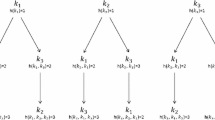Abstract
We study the set of envy-free allocations for economies with indivisible objects and quasi-linear utility functions. We characterize the minimal amount of money necessary for its nonemptiness when negative distributions of money are not allowed. We also find that, when this is precisely the available amount of money, there is a unique way to combine objects and money such that these bundles may form an envy-free allocation. Based on this property, we describe a solution to the envy-free selection problem following a pseudo-egalitarian criterion. This solution coincides with the “Money Rawlsian Solution” proposed by Alkan et al. (1991).
Similar content being viewed by others
References
Alkan A, Demange G, Gale D (1991) Fair allocation of indivisible objects and criteria of justice. Econometrica 59: 1023–1039
Foley D (1967) Resource allocation and the public sector. Yale Economic Essays 7: 45–98
Lawler E (1976) Combinatorial optimization: networks and matroids (Ed. Holt) Rinehart and Winston, New York
Maskin E (1987) On the fair allocation of indivisible goods. Arrow and the Foundations of the Theory of Economic Policy (Ed. G. Feiwel) London Macmillan
Moulin H (1992) An application of the Shapley Value to fair division with money. Econometrica, 60: 1331–1349
Quinzii M (1984) Core and Competitive Equilibria with Indivisibilities. Int J Game Theory 13: 41–60
Svensson L (1983) Large indivisibles: an analysis with respect to price equilbirium and fairness. Econometrica 51: 939–954
Tadenuma K, Thomson W (1991a) Non-envy and consistency in economies with indivisible goods. Econometrica 59: 1755–1767
Tadenuma K, Thomson W (1991b) Solutions to the problem of fair allocation in economies with indivisible goods. University of Rochester mimeo.
Tadenuma K, Thomson W (1993) The fair allocation of an indivisible good when monetary compensations are possible. Math Soc Sci 25: 117–132
Author information
Authors and Affiliations
Additional information
I am indebted to I. Gilboa for his valuable suggestions and his patience during the elaboration of the final version. I also wish to thank S. Barbera for his guidance in an earlier version and M. Boldrin, H. Moulin, Z. Neeman, W. Thomson and the referees for their comments. Financial support from FPU-MEC (Spain) is gratefully acknowledged.
Northwestern University.
Rights and permissions
About this article
Cite this article
Aragones, E. A derivation of the money Rawlsian solution. Soc Choice Welfare 12, 267–276 (1995). https://doi.org/10.1007/BF00179981
Received:
Accepted:
Issue Date:
DOI: https://doi.org/10.1007/BF00179981




